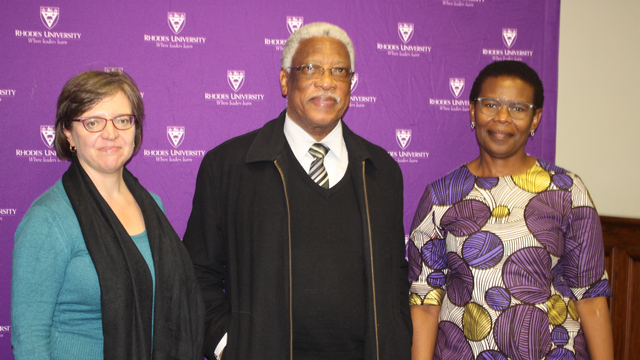
By Hazel Simpo, Psychology Honours student
Rhodes University’s Faculty of Law recently hosted Judge of Appeal, Nambitha Dambuza who gave a public lecture titled: “Customary law in South African courts - shunned?”
Although Dambuza JA was born and raised in the Eastern Cape, she obtained her LLB degree from the University of Natal in 1987 and 1989 respectively. After being admitted as an attorney, she obtained her LLM (1990) from Tulane University in the United States. She practiced as an attorney from 1992-2003 and has served as the High Court Judge in the Eastern Cape from 2005-2015. She has worked with different tertiary institutions as well as having contributed to and authored many publications and judgments.
In her public lecture, she highlighted that the subject of the public lecture was inspired by some questions that were asked by members of the Judicial Services Commission (JSC) with regards to the reluctance by judges of South African courts to apply and develop customary law. She notes that as she personally tried to interrogate this issue, she had some difficulties in understanding the real nature of the problem that the JSC raised: is it the case that courts and judges are unwilling to apply the customary law, or is there dissatisfaction with the speed at which South African customary law is developing? Dambuza JA then said that she was going to share her own responses to the questions that were raised concerning customary law in South Africa.
She explained that South Africa’s legal system is founded on the South African Constitution, 1996 and it includes customary law. “Customary law has always been part of our law and prior to the advent of the South African constitutional democracy, customary law was administered by traditional and commissioners courts as long as it was not in conflict with the common law of the land,” Dambuza JA said. However, understanding of the application of the law in certain cases was very slim because most of the judicial officers of that time were far removed from the customs held by the majority of indigenous people. Additionally, there were deliberate distortions of customary laws and practices by colonial and apartheid authorities. Therefore, outcomes of court rulings were mostly dependent on the personal attributes and philosophical assumptions of the particular judge. Presently, the Constitution is the supreme law of South Africa and section 211 (3) of the Constitution instructs that the courts must apply customary law when that law is applicable, subject to the Constitution and any legislation that specifically deals with customary law.
The Constitutional Court affirms customary law and practices but only to the extent that it is in line with the Bill of Rights. As a result, customs and customary practices that offend the Bill of Rights have been struck down as unconstitutional. For example, in inheritance practices under customary law, men are the rightful heirs to their fathers’ properties, not women. This law enables first born males to inherit everything that is left behind by the father, with the belief that if females are given the chance to do so, they will marry and take wealth/inheritance to their husband’s family and leave her maiden family destitute. She used Bhe v Magistrate Khayelitsha as an example, in which Ms Bhe successfully challenged the rule of legal inheritance that favours males. Dambuza JA pointed out that the majority of conflicts in customary law are mostly with regards to inheritance and succession.
Section 211 (2) of the Constitution specifically provides for the rights of traditional authorities to function subject to their own system of customary law, including amendments and repeals of the laws. Therefore, traditional courts as well as customary communities should be empowered to bring about their customs so that they can be in line with the Bill of Rights. However, challenges that might disturb the development of concrete customary laws in South Africa might be the nature in which people are living in the present century. This is because people are perhaps being guided by civil, common and internal law principles as well as religious beliefs, therefore constraining the proper development and application of customary law in the South African societies.
There are widespread complaints that courts are failing and refusing to recognise customary law or do not understand the particular principles of these laws. Furthermore, some scholars argue that customary law does not belong in the courts, and this has raised many arguments in the legal system. The point that scholars raise here is that customary law is founded in the way of life of the African people on their traditions, beliefs and customs that have been passed from generation to generation. However, Dambuza JA reflected that decisions, for example in divorce matters, straddled the two realms of common and customary law, making adjudication difficult.
However, Dambuza JA opined that customary law should not be shunned, but it is also difficult to enshrine it in the law since every society or group of people does have customs that differ from the others, especially in a rainbow country like South Africa. “Should customary law be implemented for poor people only?” she asked.
To sum up the discussion, Dambuza JA noted: “Of course judges face challenges with regards to passing judgments on customary disputes, but it does not mean that customary law should be withdrawn from the courts of laws.”
She emphasised that customary law is one of the most complex laws in the legal system and it takes great minds to come to a consensus when passing such judgments.
